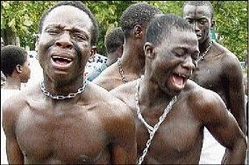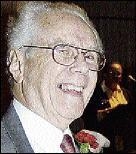Emancipation observance: A time for reflection
Published: Sunday | August 2, 2009


File photos
LEFT: Local people with chains on their necks re-enact the days of slavery in the slave port town of Badagry, south-west Nigeria on August 25, 2002.
RIGHT: Richard Hart
The following article was submitted by the Public Theology Forum, an ecumenical group of ministers and theologians.
The people of Jamaica are as divided over the reinstatement of the observance of Emancipation Day, as they have been about everything else in the social and political development of Jamaica.
The historians tell us that we were divided over whether there should be the termination of chattel slavery or not. We were divided over the advocacy for universal adult suffrage or what is now referred to as one person, one vote; same vote; same person.
There were many who were bitterly opposed to the opening of grammar schools to all and sundry at the expense of taxpayers. They were divided over the appointment of Jamaican nationals to the principalship of high schools. Many disagreed bitterly with the establishment of a university college in Jamaica in the late 1940s, and later, did not think that the University of the West Indies should become an autonomous degree granting institution.
Many Jamaicans still think that it was not in our best interest to seek national independence and there are still Jamaicans of all ethnic characteristics, class and social status, who think that the heads of the army, the Jamaica Constabulary Force, the central bank, the commercial banks, government departments and the churches, should always be overseas nationals preferably from Britain or North America. They are of the view that those from overseas are inevitably more capable and dependable, while Jamaican nationals can hardly be expected to be capable or trustworthy. You get that view daily on some of our talk shows.
Chains and the scars
Among the things that the prevalence of this outlook is saying to us, is that slavery was not just the wearing of chains and the scars of branding, being whipped for being indolent or insolent, or not enjoying the privilege of being on the same location as your spouse and children, or parents.
It is certainly more than being someone else's property and not being free to respond verbally when you are spoken about or spoken to.
In fact, it is time to say that many of those who were designated 'slaves' at the time of emancipation in 1838, were morally and psychologically the masters of those who had them in their custody and claimed to be their masters and 'drivers'.
This is the view of persons like our premier historian and liberationist Richard Hart (Hart, Slaves Who Abolished Slavery, Vol: 1 & 2 'ISER 1980, 1985) and others.
In that same vein it might be said that among the slaves at the time of the event known to us in Jamaica as Full Free; were the so-called owners of slaves and all who shared with those the proceeds from the forced labour of the persons deemed to be their property.
Slavery, therefore, is a state of mind, created and reinforced by a perception of yourself in relation to other persons, the rest of the world about you, and your ability to determine or help determine outcomes for yourself and others.
Those who see themselves as agents of what takes place about them and in relation to themselves, are free, even if they are in physical chains and deemed to be the property or subjects of others. Those who do not see themselves as being capable of changing or determining the state of things for themselves and others now or in the future are slaves.
Social status
The former and the latter statements are true, regardless of the colour of your skin, the social status of your forbears, the extent of your formal schooling, or the value of your material assets.
This means that nearly 200 years after 'Missis Queen Victoria'' decreed that the forebears of some of us were no longer to be forced to work for those whose property they were under the law - descendants of both owners and human property are still in mental, psychological, political and spiritual slavery. They do not wear chains around their necks, ankles or wrists, but are tied up without hope of release, by the myths and phobias which prevent them from affirming themselves as nationals of a sovereign nation, and participants in the shaping of their own personal and national destiny.
Another aspect of the popular perception of the observance of Emancipation Day which deserves our attention is the commonly held notion that this observance is for the descendants of slaves, since it is they who are the beneficiaries of emancipation or the termination of chattel slavery. This is a misperception that undermines our sense of national integrity and the achievement of national unity and we need to do everything possible to disabuse the minds of all our citizens of it.
Emancipation Day is as much for the successors of slave owners and the erstwhile beneficiaries of cheap labour, as it is for the descendants who were owned and brutalised in chattel slavery.
Those who are now unlike former slavers, by virtue of the genealogical characteristics and physical appearance, need to begin to see emancipation not as a time for revisiting the misery and hatred that characterised slave relationships, but rather, as occasion for the common search for reconciliation and the overcoming of the antagonisms that bedevil our national consciousness and undermine national development.
Emancipated persons love and value persons as human beings not on the basis of the texture of their hair, the shape of their nose or even their current postal address or any other feature of their personal identity. We love and value ourselves and all other nationals and non-nationals because as fellow humans everywhere else in the world, we are made in the image and likeness of God and have the same value in the sight of God.
This leads to the point that emancipation for us therefore is not an event that once a year we remember collectively or a process that is concluded, but rather, a project being pursued, not only by government officials and nationalistic activists, but by all who dare to say we are free and know and appreciate what freedom is. Needless to say, the freedom of each of us is under threat as long as there are some among us who are made to feel like trespassers without entitlements.
Powerless
Emancipation Day is an opportunity for us to look again at the state of the mind out of which so many Jamaicans think that we could be better if even a few of our cabinet ministers, judges and banking officials were born and educated in countries where the movers and shakers did not have slavery in their historical background.
We may also use the opportunity to remind those who remember their slave past with shame, that the burden of shame belongs not to the victims, but rather, to those who profited from it, not only as owners and abusers, but also as catchers, traffickers and other categories of exploiters of those who have been rendered powerless under the law of the land.
Emancipation Day, is a time when we have the opportunity to claim and own all of our history, just as the Jews and others do, to learn from the past and present of that history, how not to do to ourselves, to others and our assets, what in ignorance and misguidedness, we have done in the past and continue to do now. Nothing does more harm to our politics and our economy just now, than our self-contempt and self-doubt and the corresponding tendency to over-value everything from elsewhere and pour contempt on everything that is Jamaican.
Our prayer for Jamaicans as we celebrate Emancipation Day 2009 is that we may accept God's grace that enables us to see ourselves, and all around us, as bearers of the image of God and therefore, as being capable of achieving whatever is worth achieving in terms of our economy, our politics and our social relationships. To do this, though, we need to accept ourselves whatever the colour of our skin, the shape of our noses, the texture of our hair, the size of our bank balances and our present postal address.
We need to take on the responsibility of helping to produce the leaders and managers and affirm the present ones because they are ours, 'chastise' them graciously, when they transgress, forgive them after they have admitted their misdeeds, and with them put our energies into building the kind of nation we think we deserve as a people.
Feedback may be sent to columns@gleanerjm.com
